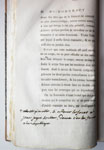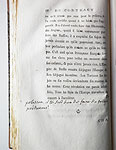The Social Contract
The Social Contract, or Principles of Political Right is Rousseau's main work dealing with political issues, in which he substantiates the principle of sovereignty of the people. On the pages of this book, Voltaire left numerous marginalia, arguing with the author. The first chapter of The Social Contract opens with the famous sentence: "Man is born free; and everywhere he is in chains". Then Rousseau wrote,If I took into account only force, and the effects derived from it, I should say: "As long as a people is compelled to obey, and obeys, it does well; as soon as it can shake off the yoke, and shakes it off, it does still better; for, regaining its liberty by the same right as took it away, either it is justified in resuming it, or there was no justification for those who took it away."
Voltaire did not understand the logic of Rousseau's argument ("Force is not right") and made the remark:
"Quite the contrary. If it has the good right to regain its liberty, there was no justification to take it away."
For Rousseau, man is not a social creature: "But the social order is a sacred right which is the basis of all other rights. Nevertheless, this right does not come from nature, and must therefore be founded on conventions." Voltaire objects:
"It is an obscure and unclear passage. This right comes from nature if nature has made us social beings."
At the beginning of the second chapter, Voltaire continues to argue with Rousseau about man's social nature. Next to Rousseau's statement "the most ancient of all societies, and the only one that is natural, is the family", he writes:"So, this right results from the nature of man." And then he responded to the statement "If they <father and grown-up children> remain united, they continue so no longer naturally, but voluntarily; and the family itself is then maintained only by convention":
"But we must admit that this convention results from nature."
Voltaire argues with Rousseau about the law of war. Rousseau believes that, by nature, human beings are not enemies of each other,
…But it is clear that this supposed right to kill the conquered is by no means deducible from the state of war. Men, from the mere fact that, while they are living in their primitive independence, they have no mutual relations stable enough to constitute either the state of peace or the state of war, cannot be naturally enemies. War is constituted by a relation between things, and not between persons; and, as the state of war cannot arise out of simple personal relations, but only out of real relations, private war, or war of man with man, can exist neither in the state of nature, where there is no constant property, nor in the social state, where everything is under the authority of the laws.
Individual combats, duels and encounters, are acts which cannot constitute a state; while the private wars, authorised by the Establishments of Louis IX, King of France, and suspended by the Peace of God, are abuses of feudalism, in itself an absurd system if ever there was one, and contrary to the principles of natural right and to all good polity.War then is a relation, not between man and man, but between State and State, and individuals are enemies only accidentally, not as men, nor even as citizens, but as soldiers; not as members of their country, but as its defenders.
"All this, it seems to me, comes out of the mouth of a cunning phrasemaker," Voltaire wrote. "It is clear that the war between State and State is a war between man and man. Let's order all our subjects to rush at each other."
Rousseau opposes the right of the strong, the right to enslave man: "No one has a right to kill an enemy except when he cannot make him a slave, and the right to enslave him cannot therefore be derived from the right to kill him. It is accordingly an unfair exchange to make him buy at the price of his liberty his life, over which the victor holds no right.""A funny assertion," Voltaire remarks on the margins.
At the same time, the Ferney philosopher, like Rousseau, hates despotism. That is why, obviously, he notes down approvingly "Good" next to the statement:
Even if I granted all that I have been refuting, the friends of despotism would be no better off. There will always be a great difference between subduing a multitude and ruling a society. Even if scattered individuals were successively enslaved by one man, however numerous they might be, I still see no more than a master and his slaves, and certainly not a people and its ruler.However, Voltaire does not agree with the trends in political thought of Rousseau, which, in future, will be named totalitarian – with the idea of the omnipotence of the state, even if the people has the total power in it, in relation to the individual:
…These clauses, properly understood, may be reduced to one — the total alienation of each associate, together with all his rights, to the whole community; for, in the first place, as each gives himself absolutely, the conditions are the same for all; and, this being so, no one has any interest in making them burdensome to others. Moreover, the alienation being without reserve, the union is as perfect as it can be, and no associate has anything more to demand: for, if the individuals retained certain rights, as there would be no common superior to decide between them and the public, each, being on one point his own judge, would ask to be so on all; the state of nature would thus continue, and the association would necessarily become inoperative or tyrannical.
Next to this famous passage of Rousseau, Voltaire marks down:"All of this is wrong. I do not give myself completely to my fellow citizens. I do not give the right to kill me and rob me by the majority. I obey to help my fellow citizens and to get their assistance, to do justice and to receive it. There is no other agreement."
Voltaire opposes total subjugation of the individual by the state. "As soon as this multitude is so united in one body, it is impossible to offend against one of the members without attacking the body, and still more to offend against the body without the members resenting it."Voltaire wittily objects: "Poor reasoning. If Jean-Jacques is punished with the rod, does it means that the Republic would be whipped?"
In the chapter “The People” Rousseau speaks of Russia. Unlike Voltaire, he was very skeptical about the activities of Peter I and gave a pessimistic outlook on the future of Russia and Europe:
Russia will never be really civilised, because it was civilised too soon. Peter had a genius for imitation; but he lacked true genius, which is creative and makes all from nothing. He did some good things, but most of what he did was out of place. He saw that his people was barbarous, but did not see that it was not ripe for civilisation: he wanted to civilise it when it needed only hardening. His first wish was to make Germans or Englishmen, when he ought to have been making Russians; and he prevented his subjects from ever becoming what they might have been by persuading them that they were what they are not. In this fashion too a French teacher turns out his pupil to be an infant prodigy, and for the rest of his life to be nothing whatsoever. The empire of Russia will aspire to conquer Europe, and will itself be conquered. The Tartars, its subjects or neighbours, will become its masters and ours, by a revolution which I regard as inevitable. Indeed, all the kings of Europe are working in concert to hasten its coming.– A loafer, such predictions are worth you!
Rousseau's The Social Contract is cited from the translation of G.D.H.Cole.









